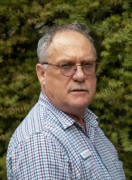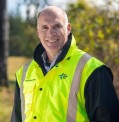2024 NZIF CONFERENCE SPEAKERS (A-Z)
Heather Arnold
 Heather leads the Environment team at PF Olsen, guiding their environmental performance and managing the PF Olsen FSC® Group Scheme. Heather has spent almost 30 years in the plantation forest industry, in environmental management and harvest planning. Prior to joining PF Olsen in 2021, Heather worked predominantly in the top of South Island of New Zealand, but is familiar with New Zealand's geological challenges, regional topographies, and regulatory requirements. She brings a practical national environmental perspective, focusing on delivering above compliance environmental outcomes and strongly advocating for environmental kaitiakitanga in all aspects of forestry.
Heather leads the Environment team at PF Olsen, guiding their environmental performance and managing the PF Olsen FSC® Group Scheme. Heather has spent almost 30 years in the plantation forest industry, in environmental management and harvest planning. Prior to joining PF Olsen in 2021, Heather worked predominantly in the top of South Island of New Zealand, but is familiar with New Zealand's geological challenges, regional topographies, and regulatory requirements. She brings a practical national environmental perspective, focusing on delivering above compliance environmental outcomes and strongly advocating for environmental kaitiakitanga in all aspects of forestry.
Heather is also on the steering committee for Wahine in Forestry. She is a collaborative leader, enjoys supporting colleagues to achieve great environmental outcomes and is a passionate advocate for plantation forestry as a sustainable primary land use.
Les Basher
 Dr Les Basher is a Research Associate with Manaaki Whenua – Landcare Research. I retired from full time employment in 2020 after a 43 year career starting in Ministry of Works Water & Soil Division and ending with MWLR. My research interests spanned soil science and geomorphology, with a main focus on erosion and sediment processes across all land uses and in all areas of New Zealand.
Dr Les Basher is a Research Associate with Manaaki Whenua – Landcare Research. I retired from full time employment in 2020 after a 43 year career starting in Ministry of Works Water & Soil Division and ending with MWLR. My research interests spanned soil science and geomorphology, with a main focus on erosion and sediment processes across all land uses and in all areas of New Zealand.
My expertise and publications span the full range from process understanding to model development and application. I led the work that resulted in the current version of the Erosion Susceptibility Classification that is one of the key tools in the NES for Commercial Forestry, and have been an advocate for a science-based risk management approach to better manage the effects of forestry in erodible steeplands. I continue to provide consultant services in erosion and sediment processes and soil science, and am involved in the current paired catchment study in Tasman District aiming to improve post-harvest sediment management.
Mark Bloomberg
 Currently teaches soil science, soil and water management, and natural forest management at Te Kura Ngahere |NZ School of Forestry, University of Canterbury. Previously also taught agroforestry and silviculture at Lincoln University, New Zealand from 1999-2018.
Currently teaches soil science, soil and water management, and natural forest management at Te Kura Ngahere |NZ School of Forestry, University of Canterbury. Previously also taught agroforestry and silviculture at Lincoln University, New Zealand from 1999-2018.
Member of the NZ Association of Resource Management, NZ Society of Soil Science (NZSSS) and the NZ Institute of Forestry.
Research area is the relationship between forests and the environment, specifically:
- Forest influences (climate and soil interactions)
- Regeneration ecology (germination, initial seedling growth)
- Silvicultural systems (alternatives to clearfelling of forests)
- Agroforestry (shade, shelter, soil conservation)
Peter Casey
 Peter is the CEO of New Zealand Carbon Farming (NZCF), joining NZCF in 2017. He has 20 years’ experience in the Forestry sector and 20 years in the Transport, Chemicals, Property and Finance sectors.
Peter is the CEO of New Zealand Carbon Farming (NZCF), joining NZCF in 2017. He has 20 years’ experience in the Forestry sector and 20 years in the Transport, Chemicals, Property and Finance sectors.
Peter is a long term member of the New Zealand Institute of Forestry (NZIF), a NZIF Registered Forestry Professional and a Chartered Accountant. Since 2018 he has been the Chair of the NZIF Registration Board and is passionate about provision of high quality forest management advice. NZCF has increased since 2017 the area of its actively managed forest lands by 390%, now being the largest NZ owner of planted managed forest.
Peters holds a B,For.Sc (Hons), MBA , and Post Graduate Accounting Diploma.
Steve Chandler
Steve’s current role is Executive Director for Tasman Pine Forests Ltd. Steve has a Batchelor of Forestry Science (BForSc) University of Canterbury (1972 –76) and a Certificate in Forest Engineering, University of Canterbury 1989.
Steve has over 50 years forestry experience as a NZ forest manager with NZ Forest Service, Carter Holt Harvey Forests Ltd, Rayonier Matariki Forests and currently Tasman Pine Forests Ltd. Steve also holds current industry memberships with the Registered Member of NZ Institute of Forestry, NZ Agricultural Education Trust Board Member and Chair of NZFOA Training and Careers Committee.
Mark Coghill
 Mark joined OneFortyOne NZ Forests as Operations Manager in 2021 after a long career in the Central North Island forests. Mark's career started with a focus on public activities with recreational forestry and continued through all forest operations including Stem Processing Plant management. With 46 years of experience in the industry, Mark has deep knowledge of commercial forest harvesting and supply chain management with a particular emphasis on Health, Safety, and wellbeing. Mark and his Operations team are dedicated to driving environmentally sustainable practices and demonstrating OneFortyOne NZ Forests’ commitment to being excellent custodians. He is passionate about finding innovative and profitable opportunities within the forestry industry, especially during tough economic times. Currently, his projects revolve around improving slash management and utilising wood fibre to benefit the environment and create economic opportunities for the Top of the South region.
Mark joined OneFortyOne NZ Forests as Operations Manager in 2021 after a long career in the Central North Island forests. Mark's career started with a focus on public activities with recreational forestry and continued through all forest operations including Stem Processing Plant management. With 46 years of experience in the industry, Mark has deep knowledge of commercial forest harvesting and supply chain management with a particular emphasis on Health, Safety, and wellbeing. Mark and his Operations team are dedicated to driving environmentally sustainable practices and demonstrating OneFortyOne NZ Forests’ commitment to being excellent custodians. He is passionate about finding innovative and profitable opportunities within the forestry industry, especially during tough economic times. Currently, his projects revolve around improving slash management and utilising wood fibre to benefit the environment and create economic opportunities for the Top of the South region.
Doug Davidson
 Doug is an established professional in the forest and wood products sector for more than 25 years. Prior roles have been in Sales and Marketing, Supply Chain Management, Regional Manager and Operations Management he is experienced in the entire supply chain of the forest industry, having worked from the growing side right through to the processing and marketing of wood fibre products internationally. In the Asian log crisis in the early 1990’s, I established a company that planted, pruned and felled forests as I could not find work as a recently qualified forestry graduate. Professionally I have previously worked for companies such as Nelson Forests Ltd(OFO), Hancock Forest Management NZ(Manulife), PF Olsen, Fletcher Challenge Forests and NZ Forest Research Institute.
Doug is an established professional in the forest and wood products sector for more than 25 years. Prior roles have been in Sales and Marketing, Supply Chain Management, Regional Manager and Operations Management he is experienced in the entire supply chain of the forest industry, having worked from the growing side right through to the processing and marketing of wood fibre products internationally. In the Asian log crisis in the early 1990’s, I established a company that planted, pruned and felled forests as I could not find work as a recently qualified forestry graduate. Professionally I have previously worked for companies such as Nelson Forests Ltd(OFO), Hancock Forest Management NZ(Manulife), PF Olsen, Fletcher Challenge Forests and NZ Forest Research Institute.
Doug is passionate about the primary industries of NZ, having interests in both farming and forestry. I am particularly keen on utilising and enhancing the value proposition of sustainable wood fibre in NZ, we sell lumber to 60 markets around the globe and we sell 90% of NZ export logs to one country. Diversification is key of which the bio-energy sector is crucial. Doug is a member of the NZ Institute of Forestry and current Board member of the Bio-energy Association.
Kai Kruse
 Kai Kruse is the Executive Director and CEO of Nelson Pine Industries.
Kai Kruse is the Executive Director and CEO of Nelson Pine Industries.
Starting as a carpenter Kai has been with the wood industry for 40 years. He has a Master’s degree and a PhD in timber business, and has held director and senior management positions in Europe and Asia-Pacific for the past 25 years in multi-national corporations like Nelson Pine Industries, Samling Global and Daiken.
Mathew McCormick
 Growing up in Marlborough Mathew developed a love for the natural environment at a young age. With many hours spent on the boat, freediving or fishing, in the hills hunting or trapping possums, or working on our family-owned orchard.
Growing up in Marlborough Mathew developed a love for the natural environment at a young age. With many hours spent on the boat, freediving or fishing, in the hills hunting or trapping possums, or working on our family-owned orchard.
Mathew's early career aspirations took him to the Military where he served four years in the Royal New Zealand Air Force. During this time Mathew learnt important skills he relies on today and learnt what he dubs my “degree in life skills”. Mathew's experience in auditing and criminal investigation then led him to the Council in August 2020.
Upon joining the Marlborough District Council Mathew worked in the investigation and complaints team for a year, navigating a world with COVID whilst learning the ropes of Resource Management Act, up until late 2021 when he transitioned into being the Forestry Portfolio lead in the Monitoring team, which is his current role today.
Mathew has spent considerable time learning, growing, and building a rapport with the local industry, wider public and iwi during my time with the Council. His opinion is that through this collaboration, positive strides have been made and the future is looking bright for all stakeholders alike.
David McGregor David McGregor is a Director of Carbona. Carbona is spearheading the development torrefaction and carbonisation projects within Australasia.
David McGregor is a Director of Carbona. Carbona is spearheading the development torrefaction and carbonisation projects within Australasia.
With a 30+ year tenure in the industrial energy sector across Australasia. David is a long-time advocate for sustainable energy, his expertise is deeply rooted in the development and promotion of biomass renewable energy sources.
David's presentation at the New Zealand Institute of Forestry conference will offer attendees valuable insights into the opportunity for biomass residues to play a significant role in New Zealand achieving its 2050 net-carbon zero targets.
Craig McMiken
 Craig McMiken is a Director and Nelson Regional Manager for Forest Management Group.
Craig McMiken is a Director and Nelson Regional Manager for Forest Management Group.
Craig started his career in Gisborne before returning to his home town of Nelson in 2000. He has a B.For Sci (hons) and is a NZIF Registered Forestry Consultant. He has 27 years experience in the forestry sector, during which he has covered a wide range of forest management, harvesting and consulting work. He loves his time out working in the forest but also for recreation in the weekends.
Penny Nelson
 Penny Nelson is the Director-General of the Department of Conservation, which is responsible for managing a third of New Zealand’s land area and protecting native species and ecosystems on both land and water.
Penny Nelson is the Director-General of the Department of Conservation, which is responsible for managing a third of New Zealand’s land area and protecting native species and ecosystems on both land and water.
Before starting at DOC in 2021, Penny was Deputy Director-General for Biosecurity NZ. Penny joined the Ministry for Primary Industries (MPI) in 2018 as Deputy Director-General Policy and Trade, where she led work shaping the future of the primary sector – enhancing the sector’s sustainability and growth.
Penny has worked across a range of areas of government, including the environment, economic development, and social development. Prior to joining MPI, Penny was Deputy Secretary at Ministry for the Environment where she was responsible for climate change, the marine environment, environmental reporting, and the science system.
She has also worked within the private and science sectors including roles at DairyNZ, the Sustainable Business Council, and Landcare Research.
Penny holds a Masters of Science in Resource Management (Honours) from Lincoln University and a Bachelor of Arts (Honours) from the University of Otago.
Graham Parker
 Graham's work as a wildlife biologist in part focuses on wildlife interactions with human industry. Projects are with forestry, farming, commercial fisheries, wind farms and tourism. He has been working in this field for the past 22 years, after an earlier career as a commercial fisher. Improving outcomes for wildlife is my driver, and whilst this is through quantitative science, the social and cultural aspects of the work, and communicating to a diverse group of stakeholders, is also a focus.
Graham's work as a wildlife biologist in part focuses on wildlife interactions with human industry. Projects are with forestry, farming, commercial fisheries, wind farms and tourism. He has been working in this field for the past 22 years, after an earlier career as a commercial fisher. Improving outcomes for wildlife is my driver, and whilst this is through quantitative science, the social and cultural aspects of the work, and communicating to a diverse group of stakeholders, is also a focus.
Chris Phillips
 Chris Phillips is a Senior Researcher in the Soils & Landscape Processes Team at Manaaki Whenua Landcare Research, Lincoln. He has over 40 years research experience in the fields of erosion processes, how vegetation mitigates erosion, and in integrated catchment management. He obtained his PhD in Agricultural Engineering from the University of Canterbury in 1989 and earlier degrees from Otago and Waikato Universities. In the early part of his career, he studied the relationship between geology and geomorphology and the implications for forest management in the Gisborne-East Coast region.
Chris Phillips is a Senior Researcher in the Soils & Landscape Processes Team at Manaaki Whenua Landcare Research, Lincoln. He has over 40 years research experience in the fields of erosion processes, how vegetation mitigates erosion, and in integrated catchment management. He obtained his PhD in Agricultural Engineering from the University of Canterbury in 1989 and earlier degrees from Otago and Waikato Universities. In the early part of his career, he studied the relationship between geology and geomorphology and the implications for forest management in the Gisborne-East Coast region.
Since then, he has been involved in a wide range of research projects the most recent of which, was a 5-year MBIE research programme ‘Smarter targeting of Erosion Control’ which he led. Describing himself as a “generalist, he is passionate about making science useful and ensuring people know what can and can’t be managed.
James Powrie
 James started with NZ Forest Service and studied forestry and geography at Canterbury. He has worked in government and corporate forestry and in agriculture, forest tourism and videography; of forest industry and interesting people of the land.
James started with NZ Forest Service and studied forestry and geography at Canterbury. He has worked in government and corporate forestry and in agriculture, forest tourism and videography; of forest industry and interesting people of the land.
He is passionate about environment, landscape function, forestry for the future, and native forest restoration.
James is the Chief Executive of the Hawke’s Bay Forestry Group, owner of RedAxe Forestry Intelligence, and leads The Urban Kākābeak Project - to ensure the survival and genetic integrity of the kākābeak species.
Warren Rance
 Warren is a forester with 30 years of international experience in production forestry across all parts of the supply chain.
Warren is a forester with 30 years of international experience in production forestry across all parts of the supply chain.
He has been involved in forestry on the East Coast since 2016, as Regional Manager for PF Olsen, General Manager of Operations for Aratu Forests, Regional Manager for Summits Forests, and is currently Regional Manager for Forest Enterprises. He also served as Chairman of the Eastland Wood Council from 2023 to 2024.
Warren has a wealth of experience in the region and has an intimate working knowledge of the issues facing the region that have become the focus of public attention over recent years.
He is passionate about doing good forestry business with positive contribution to the environments that we work in.
David Robinson
 Dave Robinson has in excess of 40 years’ experience in the forest industry working primarily in commercial plantations. He has had a varied career starting with an axe in his hands in the Forest Service he has worked in research, consulting, operation forest management and latterly holding various executive management positions in the Nelson region.
Dave Robinson has in excess of 40 years’ experience in the forest industry working primarily in commercial plantations. He has had a varied career starting with an axe in his hands in the Forest Service he has worked in research, consulting, operation forest management and latterly holding various executive management positions in the Nelson region.
Bridget Robson
 Bridget works in land resource management policy and implementation for local and central government, the forest and energy industries and Iwi. These many perspectives, over a 40 year career, inform her approach to problem solving.
Bridget works in land resource management policy and implementation for local and central government, the forest and energy industries and Iwi. These many perspectives, over a 40 year career, inform her approach to problem solving.
Shaun Truelock
 Shaun Truelock is a 3rd generation forester and joined OneFortyOne as General Manager, New Zealand Forests Ltd. in August 2023.
Shaun Truelock is a 3rd generation forester and joined OneFortyOne as General Manager, New Zealand Forests Ltd. in August 2023.
He is an experienced forester, harvesting contractor and executive with over 23 years’ immersion in forestry and forestry related businesses across operations in South Africa, Zambia, and New Zealand.
Shaun's commercial mindset, innovation, and focus on continuous improvement drive profitability and shareholder value while also prioritising the environment and community.
John Woodman
 John, a visionary leader with a penchant for solving customer problems creatively, embarked on his journey in 2002 when he founded Prolam after an 18-year tenure as the Operations Manager at Motueka Lumber. With an unwavering commitment to customer-driven innovation, he steered Prolam to its current position as the premier supplier of engineered timber across New Zealand. Recently, the company has expanded its reach into Alliance Woodware, manufacturing beehives for Australasia and North America.
John, a visionary leader with a penchant for solving customer problems creatively, embarked on his journey in 2002 when he founded Prolam after an 18-year tenure as the Operations Manager at Motueka Lumber. With an unwavering commitment to customer-driven innovation, he steered Prolam to its current position as the premier supplier of engineered timber across New Zealand. Recently, the company has expanded its reach into Alliance Woodware, manufacturing beehives for Australasia and North America.
Beyond his entrepreneurial pursuits, John is deeply invested in his team's well-being, serving as a motivating role model, and fostering a supportive work environment where everyone thrives. Committed to giving back, John and Prolam are staunch supporters of the local community, particularly the Nelson Marlborough Rescue Helicopter Trust, the Rapid Relief Team (RRT).
Through his innovative approach to problem-solving and dedication to customer needs, John continues to shape the industry landscape, driving progress and sustainability.
WOMEN IN FORESTRY BREAKFAST SPEAKER
Dr Elizabeth Heeg
 Dr Elizabeth Heeg joined New Zealand Forest Owners Association in August 2023. She has a strong background in forest systems and the regulatory and policy frameworks supporting them, including climate, biodiversity and water policy. Elizabeth has worked for the Ministry for Primary Industries, Department of Conservation and the Queen Elizabeth the Second National Trust. She is passionate about forestry’s role in the bioeconomy and the potential for forests to provide social, environmental and economic benefits. Elizabeth will be speaking at our Women in Forestry breakfast.
Dr Elizabeth Heeg joined New Zealand Forest Owners Association in August 2023. She has a strong background in forest systems and the regulatory and policy frameworks supporting them, including climate, biodiversity and water policy. Elizabeth has worked for the Ministry for Primary Industries, Department of Conservation and the Queen Elizabeth the Second National Trust. She is passionate about forestry’s role in the bioeconomy and the potential for forests to provide social, environmental and economic benefits. Elizabeth will be speaking at our Women in Forestry breakfast.
FIRE BREAKFAST BREAKFAST SPEAKER
Murray Dudfield
Fire Breakfast – What Has Gone Wrong – Is There a Way Forward for the Forestry Sector
Increases in the area burnt from wildfires in our forest and rural landscape since 2017 are a concern. Also concerning is the Fire and Emergency NZ (FENZ) annual cost has risen from $388m to $737m in 2023. FENZ plans to increase this cost in 2026 to nearly $900 million. Of this $900m, FENZ has proposed that the cost of providing an annual rural fire response in 2026/27 is $245m. This has increased from $35m in 2017. The specific allocation of costs attributed to forestry stakeholders from the proposed $245 million for rural fire response in 2026/27 isn't explicitly mentioned. However, we can explore potential factors and methods to estimate this allocation: How much of the $245m will attributed to the owners of forests? The Fire Breakfast presentation will share further information on the above mentioned concerns and the potential impact on the forestry sector.